In our lab, we abused a lot of candy bar cell phones and tortured a slider phone once. But we have never tested clamshell models. Today, we are going to present you a review of the mid-budget mobile phone which is designed with a flip form factor – the Nokia 2720 fold.
The package box is made of a thin carton (Pic. 1). In the box, as well as the phone itself there is a wall charger and a set of headphones (Pic. 2).
We had the Nokia 2720 fold in plain black color (Pic. 3, 4). The front and the back panels are glossy. The keyboard and the frame of the screen are silver (Pic. 5). The keys are large, perhaps even too large. This provides a better ease of use for the old people who are thought to be the target customers of this device. The Nokia 2720 fold features a small (1.8”) primary TFT display with a screen resolution of 128 x 160 pixels. There is also a secondary display that sports the same resolution.
The phone has an odd design. At first glance, it’s difficult to understand which panel is front and which is back. You are likely to flip the Nokia 2720 fold with the keyboard upwards because the camera is built into the back panel since almost all the other clamshell models house their cameras in the front panel.
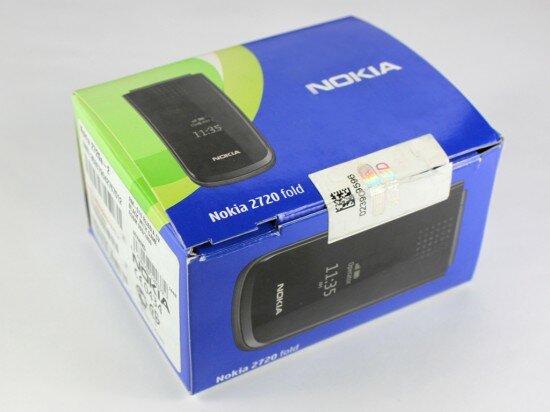
Pic. 1. Package box
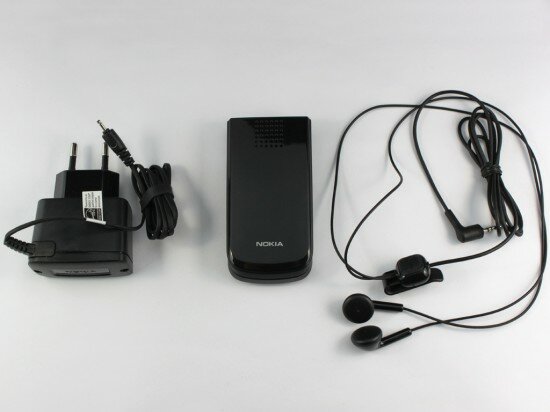
Pic. 2. Accessories
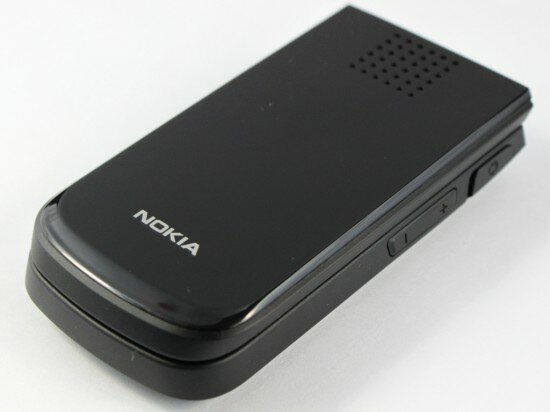
Pic. 3. Nokia 2720 fold (front panel)
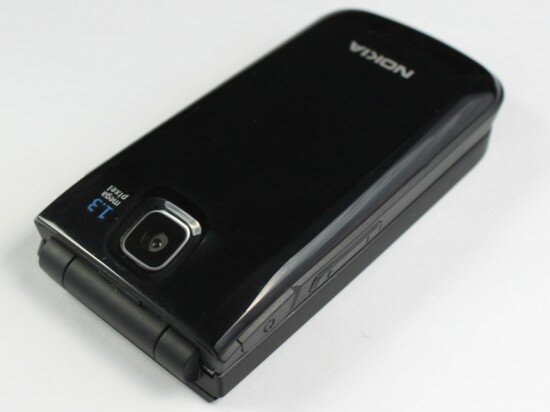
Pic. 4. Nokia 2720 fold (back panel)
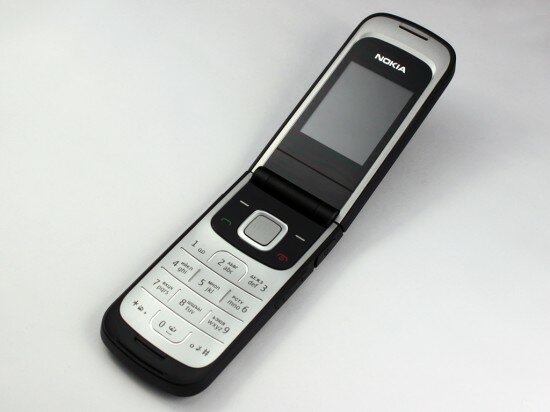
Pic. 5. Nokia 2720 fold flipped open
1. Nokia 2720 fold stress tests. Stage 1 – Light shocks
1.1 Drop test
We started with the drop test as usual. We successively dropped the Nokia 2720 fold on the carpet (video 1) with each face, edge, and corner from 1 m (3.28 ft) and on the tile (video 2) from 30 cm (11.8 inches). All in all, the phone fell for 6 times on each face, edge, and corner.
This is difficult to remove the back cover by hand. But during this test, it fell off several times. The handset showed no physical damage, though.
Video 1. Drop on the carpet from 1 m (3.28 ft)
The grade is 30 (with 30 being the highest possible grade)
Video 2. Drop on the tile from 30 cm (11.8 inches)
The grade is 30 (with 30 being the highest possible grade)
1.2 Squeeze test
It’s not a secret that anyone can break a cell phone by stepping on it. In order to find out what would happen to the Nokia 2720 fold in such situation, we placed it on a table and applied a 3 kg (6.6 lbs) pressure from a wooden bar above it (Pic. 6). This weight is too little to cause any visible harm.
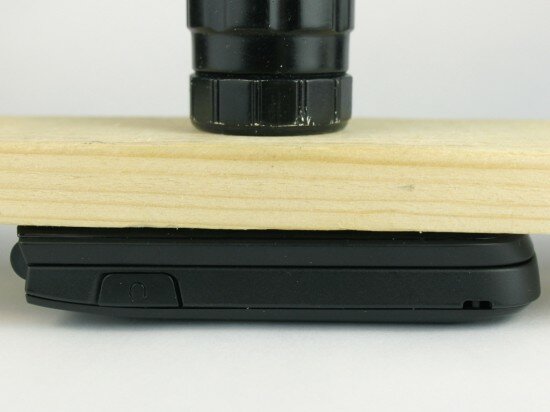
Pic. 6. The Nokia 2720 fold under the wooden bar
The grade is 24 (with 24 being the highest possible grade)
1.3 Bend test
In this test, we put the Nokia 2720 fold onto the two planks so that each edge of the phone lies on a single plank. Then we hitched a string with 1 kg load (2.2 lbs) on top of the device. The gadget showed no sign of bend and stayed functional. When flipped shut, the clamshell cell phones are twice as thick as candy bar cell phones. That’s why they show much better results in bend tests.
The grade is 24 (with 24 being the highest possible grade)
1.4 Durability
Interface components such as keys and display are protected when the clamshell is closed. This advantage allows users to keep these handsets in pockets without worrying about the screen that can be scratched.
In order to find out how durable the Nokia 2720 fold is, we placed it inside a drum together with the things that people tend to keep in their pockets: keys, pennies, and plastic balls (video 3). The drum was rotated at the speed of 500 rpm.
As a result, we saw the scuffs on the glossy panels of the phone (Pic. 7). We didn’t expect to see anything else, to be honest. The edges, however, showed even more damage. The lettering near the camera lens became a little bit abraded (Pic. 8). The Nokia 2720 fold wasn’t so attractive as before this experiment but it is impossible for any gadget to pass this test with no damage at all. In general, the handset showed good results. The protective lens glass stayed absolutely safe, by the way.
Video 3. Drum rotation
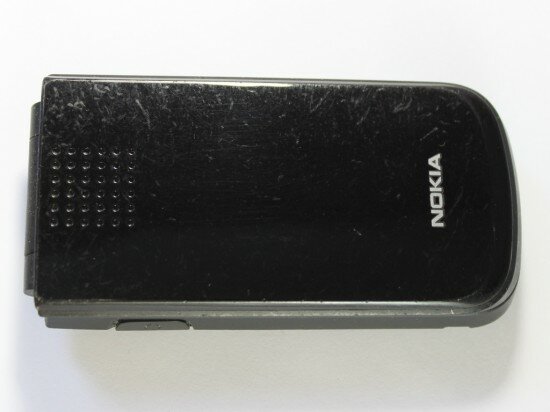
Pic. 7. Scuffs on the front panel
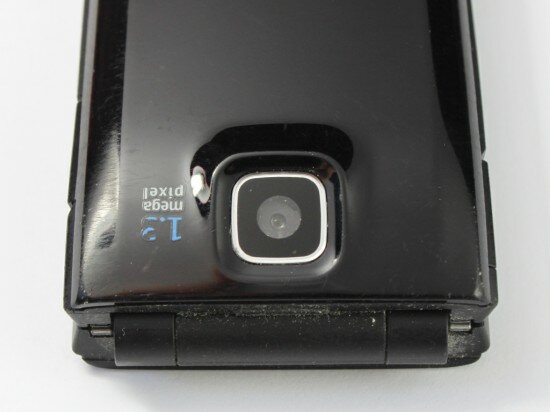
Pic. 8. Scuffs on the rear panel, the abraded lettering near the camera lens
The grade is 15 (with 15 being the highest possible grade)
1.5 Scratch test
One more way to test the body of the Nokia 2720 fold is to scratch it. Actually, we scratched the screen and the panels with a nail fixed in a plank. The applied pressure from the nail was 100 g (0.22 lbs).
The panels showed no damage at all (video 4) while the screen sustained a minor scratch (video 5).
Video 4. Panel scratching
Video 5. Screen scratching
The screen gets 15 points (with 15 being the highest possible grade)
The panels get 15 points (with 15 being the highest possible grade)
1.6 High temperature
In order to check how the Nokia 2720 fold is capable of surviving adverse conditions, for example, extremely hot weather, we did the following: we placed the gadget in a metallic container 5 cm from the electric bulb (40 Wt).
In 3 minutes we took the phone out (video 6). Both panels got hot but the interface components stayed fine. The device passed this test with no problem.
Video 6. High temperature test
The grade is 12 (with 12 being the highest possible grade)
1.7 Dust test
We took an enclosed tray containing dust and threw the Nokia 2720 fold inside it. Then we made it vibrate viciously for 2 minutes.
As a result, a lot of dust penetrated the loudspeaker grill (Pic. 9). The connectors were also dirty (Pic. 10). Few grains of dust penetrated even under the battery cover (Pic. 11). The monolithic keyboard stayed clean. However, after this test we some new scuffs on the protective lens glass. This is a strange result because grains of dust don’t inflict scuffs. In the 2nd stage of the dust test, we’ll explain you why this happened.
The cleaning of the handset wasn’t difficult. The keys performed with no squeaks. The Nokia 2720 fold stayed absolutely functional.
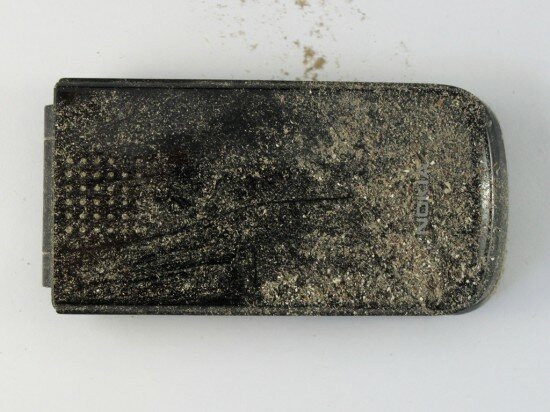
Pic. 9. Here's how the gadget looked like after the dust test
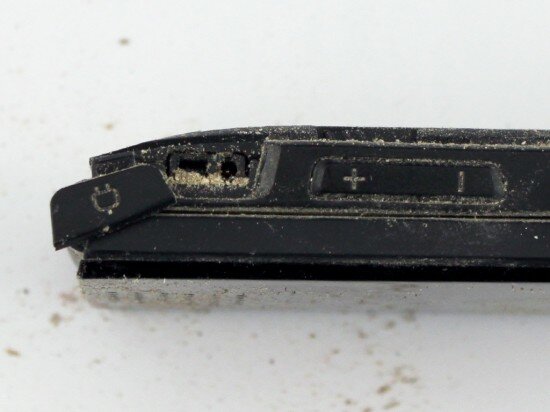
Pic. 10. Dust in the connectors
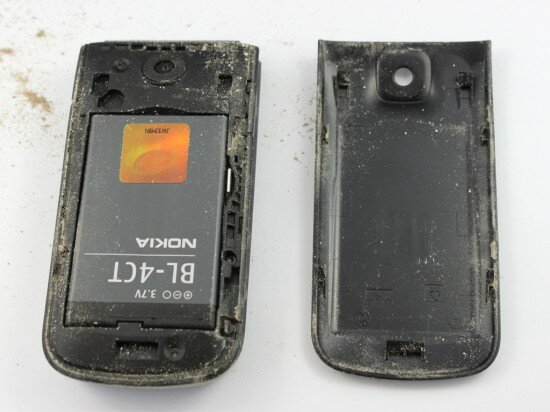
Pic. 11. Dust under the battery cover
The grade is 12 (with 12 being the highest possible grade)
1.8 Signal quality test
In order to test the reception quality of the Nokia 2720 fold, we placed it inside a box and foiled the box (the foil served as a shield). Then we made a 40 x 50 mm (1.57 x 1.97 inches) hole at the top of the box. This considerably reduced the signal from towers.
Though the signal fell to 2 points (with 4 being the maximum number of points), the Nokia 2720 fold received all the incoming calls (video 7).
Video 7. Signal quality test
The grade is 15 (with 15 being the highest possible grade)
After the 1st stage of the stress tests, the Nokia 2720 fold got 192 (with 192 being the highest possible grade)
2. Nokia 2720 fold stress tests. Stage 2 — Tough conditions
2.1 Drop test
This time, we dropped the Nokia 2720 fold on the carpet from 1.5 m (4.9 ft) and from 50 cm (1.64 ft) on the tile (video 8, 9). The result was the same as in the previous drop test: the back cover fell off all the time. But the phone showed no sign of damage.
Video 8. Drop on the carpet from 1.5 m (4.9 ft)
Video 9. Drop on the tile from 50 cm (1.64 ft)
The grade for the drop on the carpet is 30 (with 30 being the highest possible grade)
The grade for the drop on the tile is 30 (with 30 being the highest possible grade)
2.2 Squeeze test
We increased the applied pressure to 10 kg (22 lbs). The phone sustained no damage. We only heard the noise produced by the grains of sand in the seams when we applied the wooden bar above the Nokia 2720 fold.
The grade is 24 (with 24 being the highest possible grade)
2.3 Bend test
We increased the weight of the load to 5 kg (11 pounds). The handset showed no sign of bend at all.
The grade is 24 (with 24 being the highest possible grade)
2.4 Durability
We increased this test to 10 minutes. During the experiment, the back cover was removed and the battery fell out of the slot. The appearance of the battery was completely spoiled (Pic. 12). It seemed that the glossy panels became matted because of lots of scuffs and scratches on them (Pic. 13). The lettering near the camera lens became almost invisible (Pic. 14).
There is one more interesting thing: some big scuffs appeared on the protective lens glass. But this wasn’t caused by the pennies and keys. The dirt and sand that penetrated the Nokia 2720 fold in the dust test was shaken out during the rotation. These grains of sand seeped through the gaps between the protective lens glass and the keyboard and inflicted the scuffs on the screen.
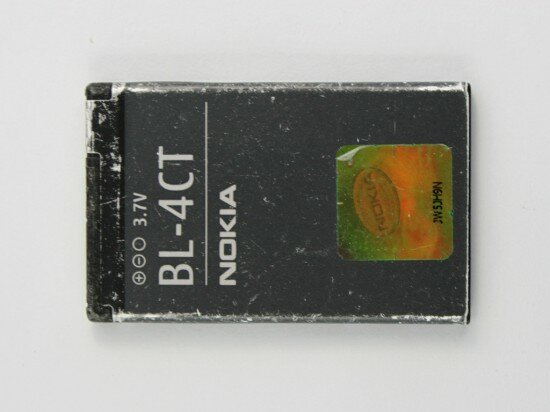
Pic. 12. Here's how the battery looked like after this test
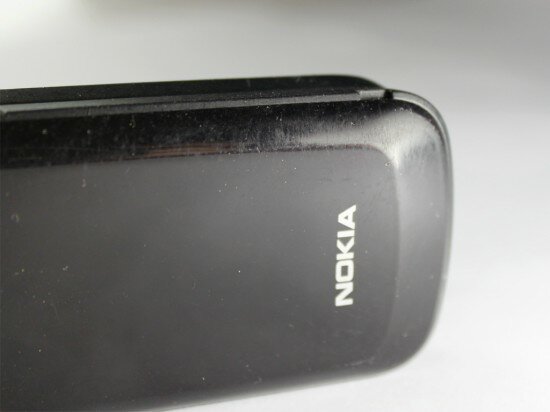
Pic. 13. Scuffs on the edges of the phone
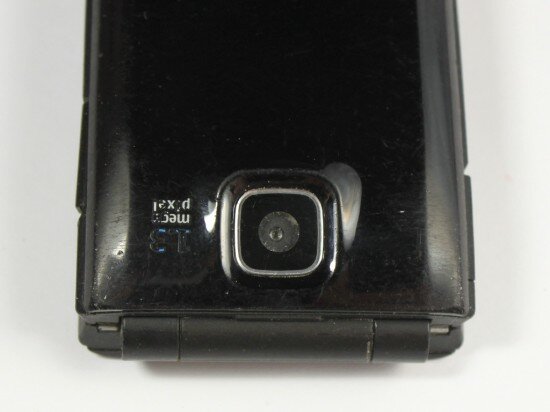
Pic. 14. Scratches and scuffs on the back panel. The abraded lettering near the camera lens
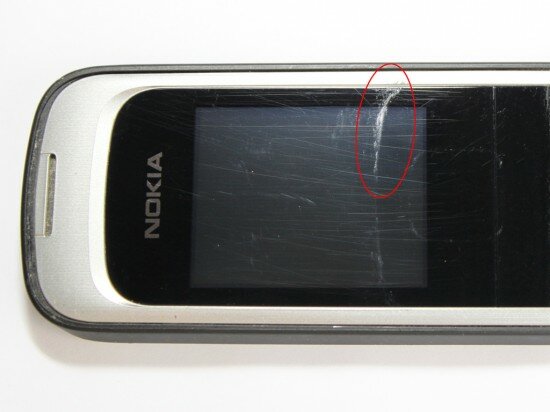
Pic. 15. Scratches and scuffs on the screen
The grade is 10 (with 15 being the highest possible grade)
2.5 Scratch test
We scratched the Nokia 2720 fold at the force of 300 g (0.66 lbs). This inflicted the scratches of the average size on the panels and on the screen (video 10). They were quite visible but didn’t strike the eye. The scratch on the protective lens glass ruined the picture (video 11).
Video 10. Panel scratching
Video 11. Screen scratching
The screen gets 10 points (with 15 being the highest possible grade)
The panels get 10 points (with 15 being the highest possible grade)
2.6 Freeze test
In this test, we checked the performance of the Nokia 2720 fold in extremely cold weather. Actually, we took a box filled with ice cubes, placed the handset in it, and then placed the box in a freezer for 2 hours. The phone was left in speaking mode during that time. The temperature in the freezer was approximately -15 °C (+5 °F).
As a result of the test, the capacity of the battery didn’t go down much (video 12). The display malfunctioned and the keys became stiffer but in general the phone performed pretty fine. We warmed the phone up and dried it to room temperature. The Nokia 2720 fold stayed functional.
Video 12. Freeze test
The grade is 12 (with 18 being the highest possible grade)
2.7 High temperature
In this stage of the test, we increased the time of heating to 5 minutes. The gadget became hotter than in the previous high temperature test but showed no damage. The quality of the pictures on both screens was fine.
The grade is 12 (with 12 being the highest possible grade)
2.8 Immersion in water
There is no doubt that liquid is the worst enemy of any electronic gadget. Only water resistant cell phones can stay functional after submersions.
We found out how the Nokia 2720 fold fares after 1 second immersion in water (video 13).
The phone showed good results, by the way. It performed pretty fine as if the ability to survive a short term immersion in water was one of the goals of the Nokia 2720’s manufacturers. The battery and the connectors stayed dry. The loudspeaker and the microphone sustained no damage.
Video 13. Immersion in water for 1 second
The grade is 30 (with 30 being the highest possible grade)
2.9 Dust test
We increased the time of this test to 5 minutes. As a result, the small grains of dust and sand penetrated the keys and made them squeak (Pic. 16). The connectors were full of dirt (Pic. 17).
We should also notice that during this test, the battery cover fell off and a lot of dust penetrated the phone. The handset stayed functional, though. This test proved the speculation that the battery cover of the Nokia 2720 can be easily lost.
We cleaned the gadget but this didn’t help us to get rid of the unpleasant noise that was heard when we flipped the phone. We did not lower the grade for the Nokia because this noise soon disappeared.
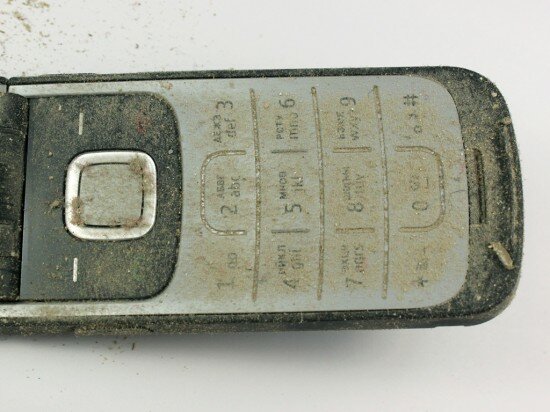
Pic. 16. Here's how the keyboard looked like after this test
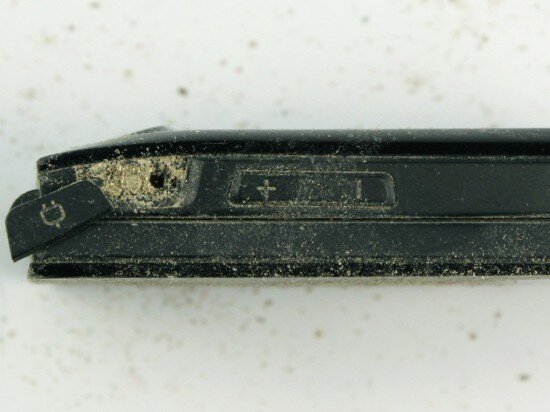
Pic. 17. Dust in the connectors protected by the lid
The grade is 12 (with 12 being the highest possible grade)
2.10 Signal quality test
We reduced the signal by placing the Nokia 2720 fold in the box with a smaller hole: 20 x 20 mm (0,787 x 0,787 inches). The signal indicator displayed only 1 bar (video 14). As a result, the phone didn’t receive all the incoming calls. Three times (with 10 being the maximum number of calls) we heard: “The subscriber is out of the coverage”.
Video 14. Signal quality test
The grade is 10 (with 15 being the highest possible grade)
After the 2nd stage of the stress tests, the Nokia 2720 fold got 214 (with 240 being the highest possible grade)
3. Nokia 2720 fold stress tests. Stage 3 — The toughest conditions
3.1 Drop test
In this stage of the test, we increased the height of the drops on the carpet (video 15) to 2 m (6.56 ft) and to 1 m (3.28 ft) on the tile (video 16). The results were the same as in the previous drop tests. The battery cover fell off all the time. The battery clung tightly to the phone and stayed safe. The handset showed no damage.
Video 15. Drop on the carpet from 2 m (6.56 ft)
Video 16. Drop on the tile from 1 m (3.28 ft)
The grade for the drop on the carpet is 30 (with 30 being the highest possible grade)
The grade for the drop on the tile is 30 (with 30 being the highest possible grade)
3.2 Squeeze test
This time, we increased the pressure to 20 kg (44 lbs). The Nokia 2720 fold sustained no visible damage, though, at first glance, this phone doesn’t seem ruggedized.
The grade is 24 (with 24 being the highest possible grade)
3.3. Bend test
We applied 10 kg (22 lbs) weight in our 3rd attempt to bend the Nokia 2720 fold. As a result, the phone showed a slight bend (Pic. 13) but stayed functional.
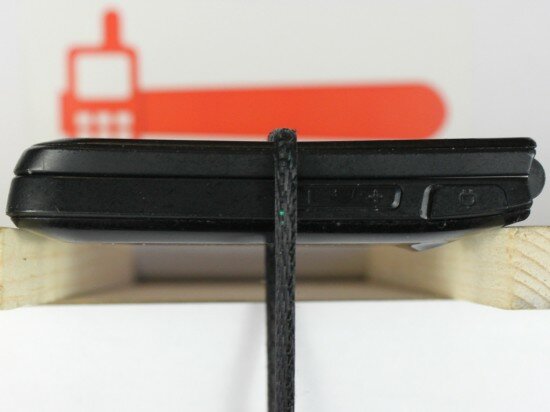
Pic. 18. The result of the bend test
The grade is 24 (with 24 being the highest possible grade)
3.4 Durability
In the last stage of this test, the drum was rotated the phone for 20 minutes. Both panels sustained a lot of damage. The scratches on the edges were large and deep (Pic. 19, 20). The lettering near the camera lens became completely abraded (Pic. 20). The protective lens glass showed more damage than in the previous durability tests (Pic. 21).
Evidently, the clamshell form factor didn’t protect the screen. The glossy panels are not durable at all.
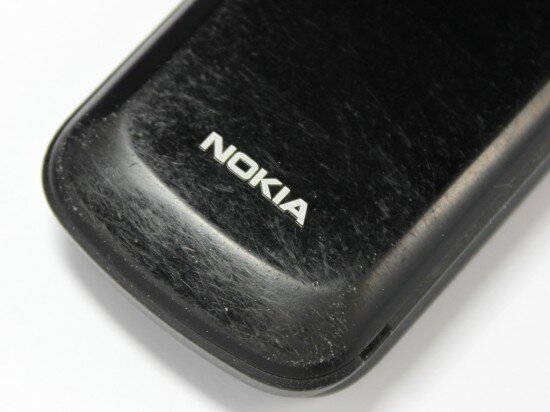
Pic. 19. Scuffs on the front panel
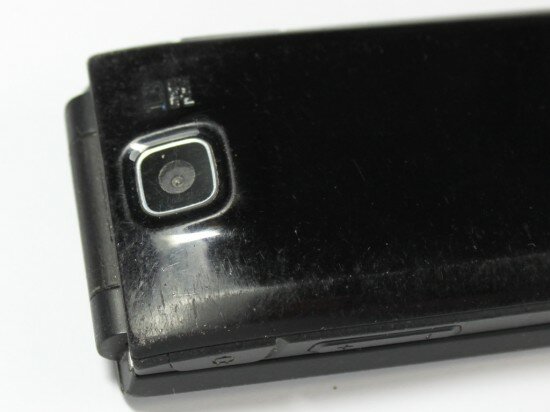
Pic. 20. Scratches on the edges
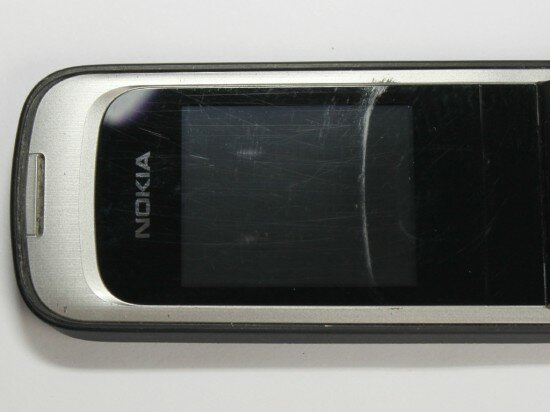
Pic. 21. Scratches on the protective lens glass
The grade is 10 (with 15 being the highest possible grade)
3.5 Scratch test
In this test, we increased the force of scratches to 600 g (1.322 lbs). This inflicted a large deep scratch on the front panel (Pic. 22, video 17). The screen also showed a large scratch (Pic. 23, video 18).
Video 17. Front panel scratching
Video 18. Screen scratching
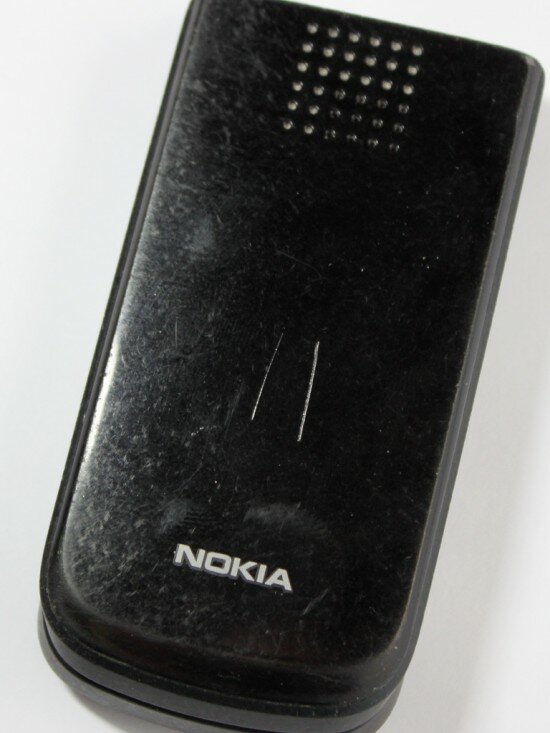
Pic. 22. The scratches on the front panel
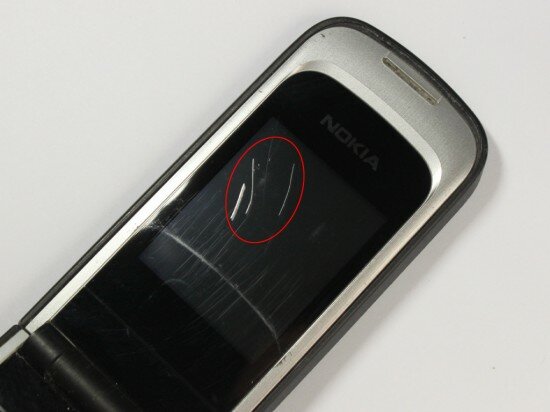
Pic. 23. The scratches on the screen
10 points for the screen (with 15 being the highest possible grade)
10 points for the panels (with 15 being the highest possible grade)
3.6 High temperature
This time, the direct rays of the bulb heated the Nokia 2720 fold for 10 minutes (video 19). This inflicted a spot on the secondary display. The spot disappeared as the phone cooled down to room temperatures. The primary display became black and showed nothing at all. But in a minute it restored its rendition as if nothing happened. The handset showed no sign of melting and stayed functional.
Video 19. High temperature test
The grade is 12 (with 12 being the highest possible grade)
3.7 Immersion in water
This time, we dunked the Nokia 2720 fold under water for 20 seconds (video 20).
This is enough time for any person to find and take out his/her cell phone out of water in case accidental drop.
In this test, water penetrated through the back cover and under the battery. The lid that covers the connectors also let water seep through (Pic. 24). The handset, however, stayed functional.
Video 20. Immersion in water for 20 seconds
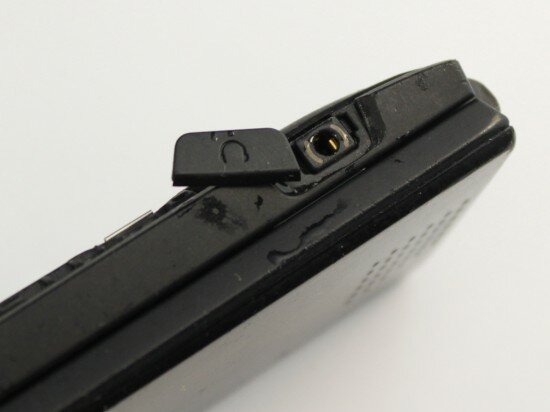
Pic. 24. Ear-microphone jack got wet
The grade is 30 (with 30 being the highest possible grade)
3.8 Immersion in beer
Beer is one of the most popular alcoholic drinks in the world and there are people who accidentally dropped their cell phones in a glass of beer.
So we decided to do the same and dunked the Nokia 2720 fold under beer for 10 seconds (video 21). The result was the same as in the water tests. The gadget performed fine because the circuit board stayed dry. The battery got wet, though. After the test, we washed and dried the phone.
Video 21. Immersion in beer for 10 seconds
The grade is 9 (with 9 being the highest possible grade)
3.9 Dust test
We increased the time of this experiment to 10 minutes.
The Nokia 2720 fold showed the same result as in the previous dust test and the previous durability test. The battery cover fell off again (Pic. 25). The connectors were dirty. We saw even large grains of sand in the ear-microphone jack and in the charger jack (Pic. 26). When the phone flipped, we heard the unpleasant noise again. It was produced by the dirt that penetrated the hinge. Some keys squeaked when we pressed them. But soon the hinge and the keys returned to their normal state.
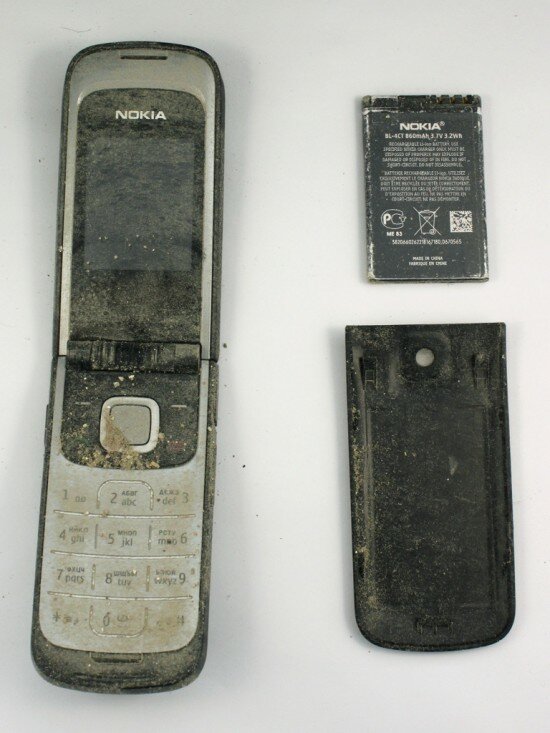
Pic. 25. Here's how the gadget looked like after the dust tests
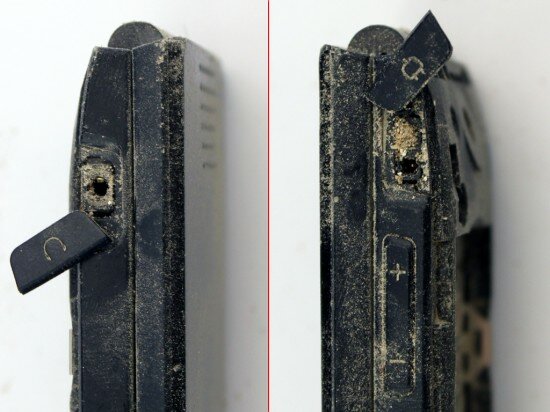
Pic. 26. Ear-microphone jack and charger jack filled with dust
The grade is 12 (with 12 being the highest possible grade)
3.10 The keyboard
We should say that the keyboard of the Nokia 2720 fold isn’t ergonomic and it’s difficult to differentiate the keys by touch because they are flat. However, the keyboard proved to be reliable and rugged. All the keys performed with no problem during the tests. There are no gaps between the keys of the num pad and the D-pad and neither dust nor liquids penetrated there. The performance of the keys in cold weather (including the volume rocker) is also fine.
The grade is 15 (with 15 being the highest possible grade)
3.11 Signal quality test
In the last stage of this test, we placed the Nokia 2720 fold in the box with the hole measured 15 x 15 mm (0,59 x 0,59 inches) (video 22). The results left much to be desired. The phone received only 6 incoming calls (with 10 being the maximum number of calls)
Video 22. Signal quality test
The grade is 10 (with 15 being the highest possible grade)
3.12 Short circuit and overcharge
We started with the battery charger. Actually, we made a short circuit of the power supply terminals with the help of the forceps for 1 second (video 23). As a result, the battery charger stayed absolutely functional.
Video 23. Short circuit of the battery charger
Then we made a short circuit of the battery for 1 second. Watch video 24 to witness how the battery stayed safe and didn’t deplete.
Video 24. Short circuit of the battery
Next, we found out the minimum and maximum charging voltage (video 25). We plugged the battery charger in the PSU and the PSU, in its turn, was plugged in the Nokia 2720 fold. We took 5 V as a standard charging voltage.
In order to find out the maximum charging voltage and the reaction of the gadget to increase in charging voltage, we increased the voltage. The phone stopped charging only at 8 V. The energy consumption grew twice as much.
The handset, however, showed much better results when we decreased the charging power. The Nokia 2720 fold stopped charging when the voltage was less than 5 V and regained charging when we made it standard again.
Video 25. Increase/decrease in charging voltage
Finally, we checked the reaction of the phone to the increase and decrease in energy supply. We took the battery out and plugged the PSU in the phone. At first, we increased energy supply until we reached 7 V (video 26). The Nokia 2720 stayed absolutely functional. When we decreased the energy supply to 3 V, the phone switched itself off.
Video 26. Increase/decrease in energy supply
For the ability to withstand short circuits the battery charger gets 15 points (with 15 being the highest possible grade)
For the ability to withstand short circuits the battery gets 15 points (with 15 being the highest possible grade)
For the ability to withstand an increase/decrease in charging voltage the Nokia 2720 fold gets 15 points (with 15 being the highest possible grade)
For the ability to withstand an increase/decrease in energy supply the Nokia 2720 fold gets 15 points (with 15 being the highest possible grade)
3.13 Disassembling
The build quality of the Nokia 2720 fold is the same as in all the other mid-budget phones (Pic. 27). The circuit board is similar to that of the Nokia 2330. The only difference between them is the arrangement of some units (Pic. 28). It’s true that the build quality is “cheap” but at the same time it’s not poor. The design of the board is compact. Some elements are fixed in the loop which makes it more expensive to replace. The engineers didn’t care much about the maintainability of this handset because there is only one element of the circuit board that can be removed. The others are soldered.
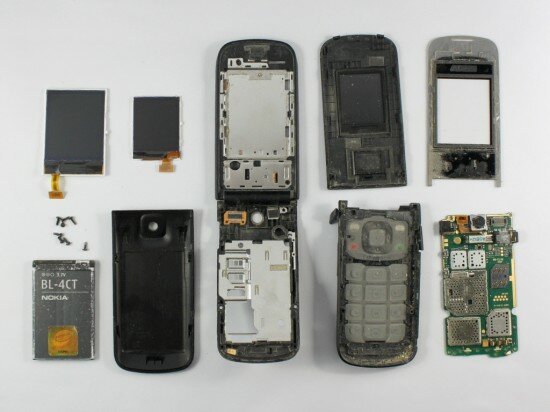
Pic. 27. The Nokia 2720 fold disassembled
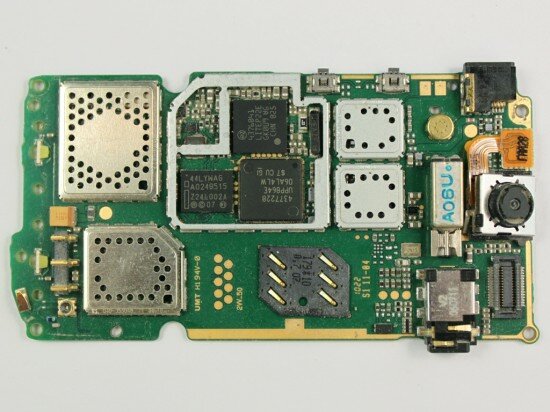
Pic. 28. The circuit board of the Nokia 2720 fold
The grade is 15 (with 15 being the highest possible grade)
After the 3rd stage of the stress tests, the Nokia 2720 fold got 331 points (with 351 being the highest possible grade)
This is not the first case when the low-end cell phone outperforms the expensive smartphones. Simple things are more reliable than complicated things.
Among the advantages of the Nokia 2720 fold we can point out the ability to withstand drops and bumps. The back cover is likely to fell off, though. But this is the only thing that can happen if you drop this gadget on the floor. The phone also stayed functional after the immersion in water and in beer. The Nokia 2720 sustained no damage in the squeeze and the bend tests and showed appropriate reaction to the increase and decrease in charging voltage and in energy supply. The capacity of the battery didn’t go down very fast in cold weather. By the way, the handset can resist high temperatures.
Among the disadvantages we should mention the low quality material of which the phone is made. You’ll probably witness some scuffs and minor scratches after some months of everyday use. In extremely cold weather the picture on the screen may become indistinct. As for the battery cover, we advice you be cautious because it can be lost.
Here’s how the phone looks like after all the tests (Pic. 29, 30, video 27).
Video 27. Here’s how the phone looks like after the tests
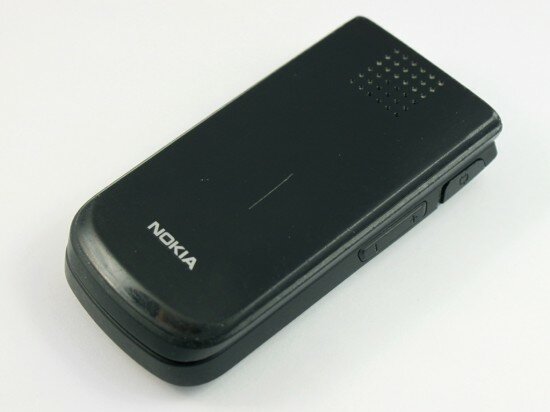
Pic. 29. The front panel of the phone after the tests
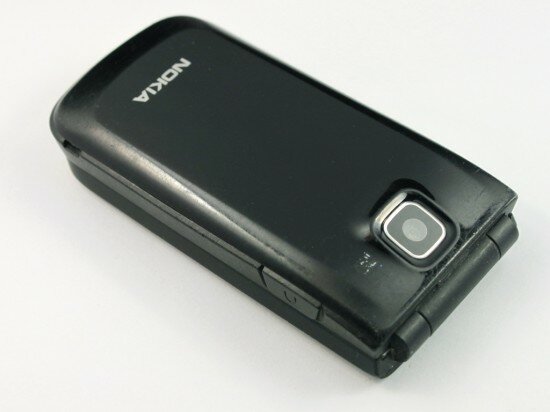
Pic. 30. The back panel of the phone after the tests

 Russian version
Russian version